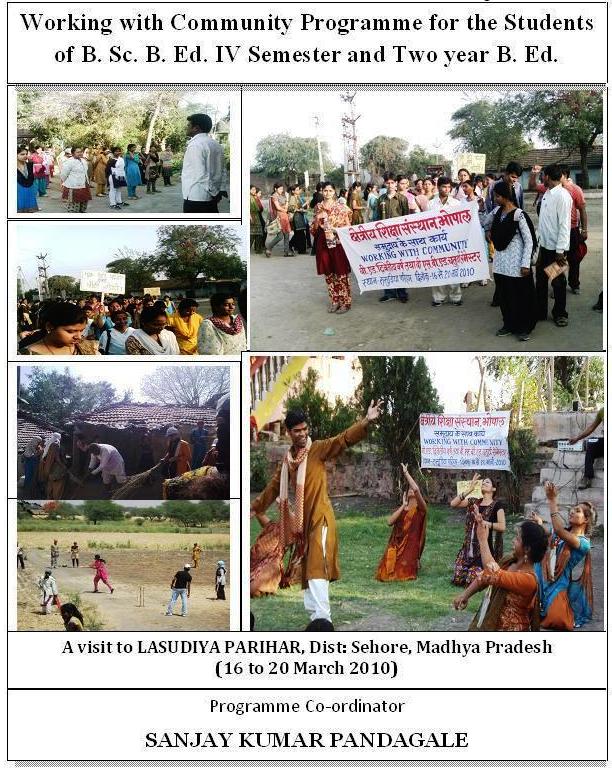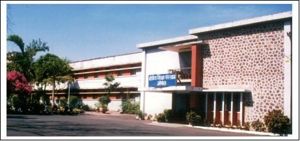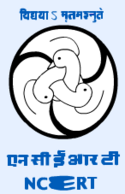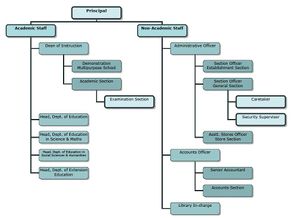Regional Institute of Education, Bhopal
|
Regional Institute of Education (RIE), Bhopal It is a constituent unit of NCERT, New Delhi. The Regional Institute of Education (RIE), Bhopal looks after teacher education and other educational requirements of the States of Chhattisgarh, Goa, Gujarat, Madhya Pradesh, Maharashtra and UTs of Dadra and Nagar Haveli and Daman and Diu.
The Institute is located at Shyamla Hills and is 7 Kms away from both Bhopal and Habibganj railway station and it is about 20 Kms from Raja Bhoj Airport, Bhopal.
The Organisational structure of the RIE Bhopal is as follows:
The major roles and functions of the RIE, Bhopal are as follows:
- To act as resource centre for conducting research, training and development of school education and teacher education.
- To prepare quality teachers and teacher educators at all levels of school education. This is done through various pre-service courses i.e. B.Sc. B.Ed., B.Ed. M.Ed. and Post Graduate Diploma in Guidance and Counselling, and in-service teacher training programmes conducted throughout the year.
- To undertake pilot studies and research projects on all aspects of school education.
- To conduct in-service training programmes for teachers, teacher educators, supervisors and administrators concerned with school education and according to the needs of the States/Union Territories of the region.
- To provide necessary help to the state agencies concerned with school education.
- To act as support system for institutions like SCERTs/ DIETs/ CTEs/ IASEsS/ Block Education Centres in the western region
- To produce instructional material for school education.
- To advise state departments of education on policies and programmes related to various aspects of school education.
- To act as monitoring and co-ordination agency for effective implementation of centrally sponsored scheme in the field of school education. For example at present, RIE Bhopal is monitoring institute of SSA for the State of Chhattisgarh.
- To provide consultancy services and extension programmes of national and international level.
|
Courses offered by RIE, Bhopal
|
|
The following courses are offered by the institute at present :
Pre-service Programmes
1. Four Year Integrated B.Sc. B.Ed. (Four Year Integrated Course)
- The four-year course, the first of its kind in the country, provides for complete integration of content and pedagogy evenly distributed throughout the duration of the course.
- The 80 students, drawn from the western region admitted to the course every year, are well grounded both in content and pedagogy.
- The two groups opt for (Physics, Chemistry, Maths and Physics, Chemistry, Biology) enable them to become TGTs of Maths/Science and TGTs of Science respectively.
- The medium of instruction is English but they are competent to teach through Hindi/English medium.
2. Two Year B.Ed. (Secondary)
- The Two - year course, based on the recommendations of National Council for Teacher Education (NCTE), and designed to meet the professional requirements of secondary school teachers, provides quality teachers for secondary schools in Science and Maths, and Languages and Social Sciences.
- The 80 students, drawn from the western region and admitted to the course every year, opt for either biological or physical Science and Maths or Social Sciences and Languages. This entitles them to become efficient teachers of Science/Maths, and Social Sciences and Languages respectively.
- Students from Social Sciences and Languages group have to Study any of the five languages – Hindi, English, Urdu, Gujarati and Marathi. The language that they study during the period enable them to become language teachers of the language concerned.
- History, Geography, Political Science, and Economics are well integrated and taught as a single subject. The course is so designed that the students are well versed in content as well as pedagogy. This enables them to become quality teachers of Social Sciences taught as a single subject at schools at the secondary level.
3. M.Ed. (RIE)
- The one-year M.Ed. (Elementary Education) course is designed on the approval of NCTE to cater to the needs of Elementary Teacher Training Institutions, specially DIETs.
- It prepares teacher educators to work in the area of elementary teacher education.
- The special feature of the course is to prepare teacher educators for Educational Research and field based studies specially in the area of Elementary Education.
At present the course has 25 seats.
4. International Diploma Course in Guidance and Counselling
The course aims to train in-service teachers, teacher educators, educational administrators and untrained guidance personnel as counselors or teacher counselors to guide and counsel students in school and related settings. In order to make the course accessible to large numbers, this course has now been redesigned with components of distance/online and face to face mode. For more information on this course visit: www.ncert-idgc.org
Internship Programme
- An eight-week internship programme for B.Sc, .B.Ed. students in the fourth year, a three- to- four -week programme for B.Ed. Ist year students, and an eight-week programme for B.Ed. 2nd year students, provides them school experience under SEP (School Experience Programme) which eventually enables them to develop the competencies they would require for imparting quality education in future.
- A practicum (internship) of PGDGC programme is organized for eight weeks for field practical training and assessment.
Field Work with Community[1]
- Field Work with Community is one of the activities students of B.Sc.B.Ed. and B.Ed. are involved in besides Work Experience, Physical Education, and Aesthetic Education.
- It exposes them to the actualities of life that help them develop the skills they would require while interacting with the community in future.
University Examinations
- The Institute is affiliated to Barkatullah University, Bhopal for the award of degrees.
- The PG Diploma in Guidance and Counselling is awarded by NCERT.
Campus Placement Cell
- The Campus Placement Cell at the Institute works for the placement of students.
- The students of B.Sc. B.Ed., and B.Ed. have been well placed at KVs , JNVs, DAVs, Atomic Energy Ed. Society and similar other reputed schools of the country.
- The students of PGDGC have been recruited as counsellors at schools and organizations that look for them.
- The students of M.Ed. (Elementary Education) have been employed as teacher educators at different Teacher Training Colleges/Institutions.
In-service Programmes
- Institute also conducts in-service teacher education courses of short duration throughout the year.
- Seminars and conferences on the issues of school education and teacher education.
|
|
|
|
|
The National Policy on Education (1986) has clearly spelt out that “Local Communities through appropriate bodies will be assigned a major role in the programme of school improvement”. Thus Community involvement and Participation in the management of education becomes essential as a key determinant of the quality of implementation of school programmes.
Realizing this fact, various initiatives of the Government targeted to bring reforms in the system of management of education. DPEP, SSA, Lokshala Project etc., have not only shown immense concern for community participation but also have conceived mechanism to ensure it. The mechanism conceived under various programmes and policies tend to focus on the fact that the school, particularly the teachers, should take the leadership role in bringing community closer to the school. This can be evident from the role supposed to be played by the teachers in the formation of VEC, PTA, MTA; and organization of the meetings of these associations.
With regard to community mobilization and participation in the District Primary Education Programme of the country steps have been taken by MHRD to conduct impact studies and research activities. One such report was published in January 1988 on community mobilization and participation. The primary focus of the study was an assessment of the status dynamics and potential of community mobilization and participation of Village Education Committees in accomplishing the goals of District Primary Education Programme. The findings may be seen from the following: Emergence of Village Education Committee as village level institutions working on issues of basic education is beginning to take shape. A vibrant and active Village Education Committee supported by regular activities for wider community mobilization can become the most crucial factor in accomplishing the goals of District Primary Education Programme in the Project area. While orientation of members of Village Education Committee has been carried out in the entire project Districts, regular and sustained capacity building of Village Education Committee as a whole has been much less common.
The guidelines circulated by Sarva Sikhya Abhiyan Samiti of Government of India to different states during 2002-2003 envisage a comprehensive and consolidated effort to achieve the goals of Universalisation of Elementary Education before 2007. It puts emphasis on community mobilization and empowerment of the community through participatory approach. It also puts emphasis on holistic and convergent approach towards Universalisation of Elementary Education (UEE). It aims at bridging the gender and social gaps in a time bound and integrated system.
Vision-2020 (India) says that Human beings are distinguished among all living species by their capacity to develop and think. Though development is often measured in terms of so many miles of roads, number of tall buildings, airports, cars, TVs, computers etc., it is not things and places alone that define development. Development must be people centric. Twenty years hence, the people of India will be more numerous, better educated, healthier and more prosperous than at any other time in our long history. Having eradicated the scourge of famine that plagued the country for centuries, we still confront the challenging tasks of providing a nutritious diet to all our children, educating our teeming masses, abolishing epidemic diseases and creating employment opportunities for all our citizens.
Working with Community Programme: The Experiment
Keeping in view the above mentioned requirements and recommendations, Regional Institute of Education, Bhopal included Working with Community Programme as an integral component of teacher training programme in camp mode. This was the third successful year of this programme.
Method of Participation
Discussion, rally, poster and banneer display, theme based cultural programme, Survey, interview, action research, case study, participant observation, dissemination of success stories, interaction with community members etc. were included in the Working with Community Programme.
Modalities of Programe
The details of the modalities of programme, including selection of venues, organization of camp and daily routine followed are as follows:
Selection of Venue
One village namely, Lasudiya Parihar was selected as the venue of the programme. It is situated at a distance of 32 Kilometer from RIE, Bhopal. The village is located in the Sehore District of Madhya Pradesh.
Organization of the Camp
After discussion with the school authorities and community functionaries the modalities of the programme were formulated. The local Sarpanch, Police officer, Medical officer, and District Collector were contacted for the smooth conduct of the camp.
Objectives of the Programme
- To study the actual life style and experiences of village Lasudiya Parihar of District Sehore (M.P).
- To make the student to understand and realize complex socio-economic, cultural, educational problems, through actual work situation in the community.
- To develop insight and attitude towards social problems.
- To understand the relationship between school and community.
- To identify the illiterate youths and organize classes for them.
- To interact with school teachers and students to find their problems and helps them to over come.
- To interact with community members with reference to academic enrollment and dropout rate of children of community.
- To arrange meeting talks, demonstration and exhibition to develop awareness about the problems of community.
- To make a survey of health and hygiene and Villagers way of living.
- To conduct interviews of village Sarpanch, Teachers, Craft man, Farmers, Laborers regarding their works and their Problems.
- To participate in cleaning the surroundings of road sides of the village, tree plantation involving with community members.
 Do not hesitate to contact me at sanjaypandagale@gmail.com, if you need any information to organize WORKING WITH COMMUNITY programme. Do not hesitate to contact me at sanjaypandagale@gmail.com, if you need any information to organize WORKING WITH COMMUNITY programme.
Feedback & Notes from my WikiNeighbours
Please put your words of feedback and suggestions here........
|
|
Background
|
|
The Regional Institute of Education, Bhopal is a constituent unit of National Council Of Educational Research and Training, New Delhi. It offers regular courses like B. Sc. B. Ed. IV year, B. A. B. Ed. IV year, Two Year B. Ed., M. Ed. In B. Sc. B. Ed. I year and Two Year B. Ed. their is a paper on Working with Community. To fulfill the requirement of this paper, this year, a 5 days camp was organised from 16 to 20 March 2010 in Sehore district of Madhya Pradesh.
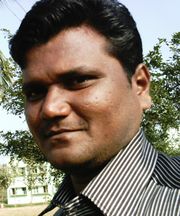 Mr. Sanjay Kumar Pandagale, Lecturer in Education and Co-ordinator of Working With Community This effort was coordinated by Mr. Sanjay Kumar Pandagale, Lecturer in Education and the peer team consisted of Mr. Suresh Makwana, Dr. Rizwan Ul Haque, Miss Deepa Agarwal, Mr. Mahendra Barua, Dr. Suneeti Khare and Mr. Sandip Ratnere who are faculty members in different Department of Regional Institute of Education, Bhopal.
Mrs. Sarika C. Saju oriented students about how to conduct Case Study. Mr. Ananad Valmiki delivered on the techniques of interview and Dr. B. Ramesh Babu gave his valuable guidance on conducting survey.
Prof. K. B. Subramanium, Principal, Prof. M. N. Bapat, Dean Of Instruction, Dr. S. K. Gupta, Head of Education, provided valuable guidance in this joint venture.
Group Leaders
Chief Leader : Shyama Devi
Asst. Chief Leader : Ranjeet Bhoya
Group Leaders
- Deepti Kavathekar
- Shweta Rai
- Dharmendra Patil
- Pappulal Ahirwar
- Rakhi Chilate
- B. Sc. B. Ed. IV semester
- Akangchha
- Deepika Soni
- Parul Somkuwar
- Ruchi Bhardwaj
- Kiran Vishvakarma
- Karuna Jaiswal
- Suprina Vishvakarma
See here the List of student’s participated in the Camp...
|
|

